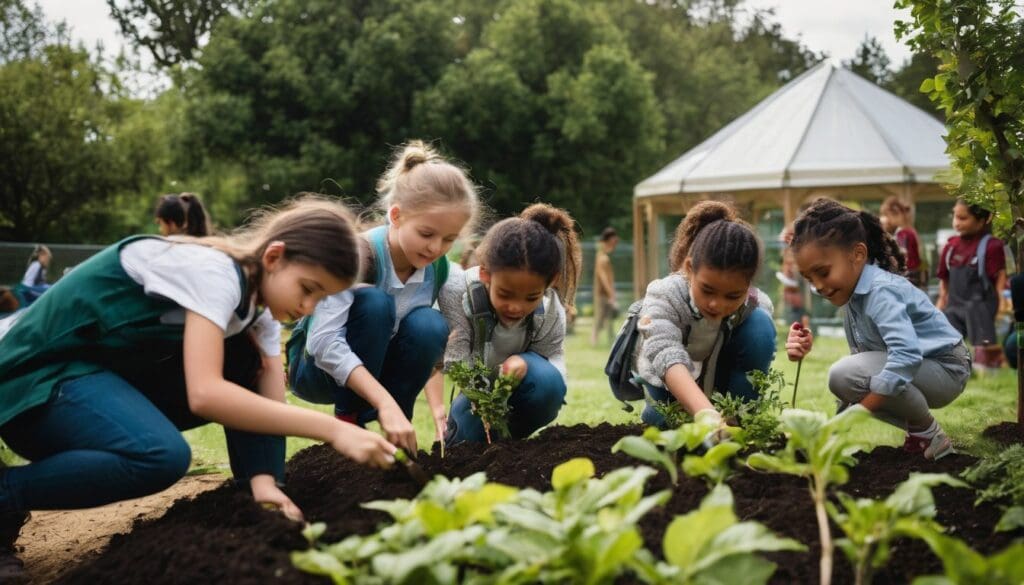Global warming is changing our planet, causing worry for us all. Schools and colleges around the world can play a huge part in fighting this issue. This blog will show how education arms people with tools to protect our environment.
Let’s make a difference together!
Key Takeaways
- Education in climate change offers vital knowledge and skills to understand global warming’s impacts, encouraging individuals to adopt sustainable practices.
- Youth – led activism is influential in raising awareness about climate change, emphasising the role of students as drivers for environmental action and policy change.
- The progression of climate education in the UK is hindered by challenges such as political resistance, outdated textbooks, and insufficient teacher training.
- Developing green skills through educational programmes prepares communities to cope with a changing environment while promoting sustainability and employment opportunities.
- Advancing climate education depends on enhancing environmental literacy and fostering a culture that values ecosystem protection and responsible resource management.
The Importance of Climate Change Education
Climate change education is crucial for understanding the impacts of global warming and equipping individuals with the necessary knowledge, skills, and values to drive the transition to a sustainable future.
It plays a vital role in creating awareness and fostering action towards combating climate change.
Understanding the impacts of climate change
Understanding the impacts of climate change means recognising how rising temperatures, extreme weather events, and shifting wildlife populations affect our planet. Changes in global climate patterns can lead to severe droughts or floods, impacting food supply and human health.
These consequences also create economic strains as communities must repair damage and adapt infrastructure to increasingly unpredictable conditions.
Education plays a vital role by raising awareness about the causes of these changes and their potential ramifications. It encourages individuals to reduce their carbon footprint through everyday actions such as conserving energy, using renewable resources, and supporting ecological conservation efforts.
Knowledge empowers people to demand sustainable practices from industries and governments alike, pushing for policies that promote environmental sustainability on a larger scale.
Equipping individuals with knowledge, skills and values
Education plays a crucial role in equipping individuals with the knowledge, skills, and values needed to combat global warming. By providing education on climate change awareness and sustainable development, people can gain a deeper understanding of the environmental challenges we face.
This empowers them to make informed decisions and adopt green technologies and renewable energy practices, contributing towards emission reduction and a more sustainable future.
Through environmental education, individuals can develop green skills that are essential for adapting to a changing climate. Emphasising the importance of sustainable development helps instil values of caring for the environment in future generations.
As such, education acts as a catalyst for driving climate action on both individual and collective levels.
Driving the transition to a sustainable future
Equipping individuals with knowledge, skills and values empowers them to drive the transition to a sustainable future. Understanding the impacts of climate change and embracing green technology are essential in combating global warming.
Encouraging environmental awareness and promoting sustainability education plays a critical role in preparing for a warming world. Developing green skills enables communities to adapt to the climate crisis while fostering a culture of caring for the environment paves the way for a sustainable future driven by educated, environmentally conscious individuals dedicated to supporting conservation and environmental protection.
Climate Education in the U. S. : Progress and Challenges
Climate education in the U.S. has made progress, but still faces obstacles such as political resistance and a lack of comprehensive curriculum in textbooks. Professional development for educators is also needed to improve climate education.
Current status of climate education
The current status of climate education in the U.S. varies widely across schools and states, with some integrating comprehensive climate change curriculum while others offer minimal to no education on the topic.
Funding constraints often limit the development and implementation of effective climate education programmes, resulting in a lack of standardised material for students. Additionally, political influences at both state and national levels can impact the depth and accuracy of climate content within educational materials.
Moreover, textbooks do not consistently cover up-to-date information on global warming and its impacts, hindering students’ access to accurate knowledge. Professional development opportunities for educators to enhance their understanding of climate change are limited or non-existent in many areas as well, further inhibiting comprehensive climate education within schools.
Obstacles to progress (politics, textbooks, lack of professional development)
Politics, textbooks, and lack of professional development pose significant obstacles to progress in climate education:
- Political pressures can hinder the inclusion of comprehensive climate education in school curriculums, leading to a lack of awareness among students.
- Outdated or biased textbooks may present inaccurate information about climate change, hindering students’ ability to develop a clear understanding of the issue.
- The absence of professional development opportunities for educators can limit their capacity to teach about climate change effectively, perpetuating a cycle of inadequate instruction.
The Role of Students in Combating Global Warming
Encouraging young people to take action is essential in combatting global warming. Youth-led climate activism plays a significant role in raising awareness and driving positive change.
Youth-led climate activism
Young people are taking the lead in advocating for climate action. They are organising strikes, marches, and campaigns to raise awareness about global warming and demand meaningful change from policymakers.
Through social media and grassroots movements, youth-led climate activism is making a significant impact in pushing for urgent measures to address the climate crisis.
By participating in these initiatives, young individuals are demonstrating their commitment to creating a sustainable future. Their passion and determination inspire communities to join forces in combatting global warming through collective action.
Encouraging young people to take action
Encouraging young individuals to become involved in combating climate change is crucial for building a sustainable future. Empowering them with knowledge about the impacts of global warming and fostering their critical thinking skills can inspire innovative solutions.
By promoting environmental literacy and instilling a culture of care for the planet, we can motivate youth to take meaningful action towards addressing the climate crisis.
Empowering young people to engage in environmentally conscious choices and advocate for change is fundamental in driving progress towards a sustainable future. Providing opportunities for experiential learning on green skills equips them with the tools needed to adapt and thrive in a changing climate, fostering resilience and innovation within our communities.
Education’s Role in Adaptation to Climate Change
Education plays a crucial role in preparing individuals for the effects of climate change by developing green skills and knowledge to navigate a warming world. It empowers people to adapt and respond effectively to the challenges ahead.
Developing green skills
Education equips individuals with the essential knowledge and practical skills needed to navigate a rapidly changing climate. Learning about sustainable practices, such as renewable energy technologies and eco-friendly agriculture, help prepare individuals for a warming world.
Green skills training enhances employability while contributing to the global effort in combating global warming.
Fostering green skills through education empowers communities to adapt to climate change while promoting environmental sustainability. By integrating practical learning experiences into educational curricula, students gain valuable expertise in areas like conservation, waste management, and sustainable resource utilisation.
Preparing for a warming world
Preparing for a warming world involves embracing sustainable practices and adapting to changing environmental conditions. Individuals can start by reducing their carbon footprint through energy-efficient choices, such as using renewable energy sources and conserving water.
Additionally, it is essential to support policies that promote resilience in the face of climate change, whilst also advocating for investments in green infrastructure and technology.
Adapting to a warmer world requires proactive measures at both the individual and community levels, emphasising the importance of education on sustainable living and resource management.
To prepare for a warming world, communities can invest in urban planning that encourages walkability, public transport, and green spaces. Furthermore, individuals should be equipped with knowledge on preparing for extreme weather events through disaster preparedness training and building resilient communities.
How to Advance Climate Education
Promoting environmental literacy is crucial in advancing climate education. Creating a culture of caring for the environment will also help to drive forward sustainable education efforts.
Promoting environmental literacy
Promoting environmental literacy is essential in equipping individuals with the knowledge and skills needed to address global warming. Education plays a crucial role in fostering an understanding of climate change impacts, sustainable practices, and the value of protecting our environment.
By promoting environmental literacy, we empower individuals to actively engage in conservation efforts and make more informed decisions that contribute to a sustainable future.
Fostering environmental literacy involves instilling a culture of caring for the environment through education for sustainable development. It encourages proactive involvement in mitigating climate crisis effects and developing green skills necessary for adapting to a warming world.
Creating a culture of caring for the environment
Foster a culture of environmental stewardship and responsibility through education. Encourage eco-friendly habits and sustainable living practices. Inspire a sense of duty towards protecting the planet for future generations.
Raise awareness about the interconnectedness between human actions and their impact on the environment.
Instil an ethos of conservation, emphasising the importance of reducing waste, conserving resources, and embracing renewable energy solutions. Educate communities on how small individual actions can collectively make a significant difference in combating global warming.
Conclusion
In conclusion, education plays a vital role in tackling global warming. It empowers individuals with the knowledge and skills needed to address climate change. By promoting environmental literacy and fostering a culture of caring for the environment, education can drive the transition towards a sustainable future.
Encouraging young people to take action and developing green skills are crucial aspects of advancing climate education.
FAQs
1. What is the role of education in combating global warming?
Education plays a crucial role in combating global warming by teaching people about the climate crisis and ways to live sustainably for the future.
2. How does global warming education help the environment?
Global warming education informs students about how human actions affect climate change, encouraging them to take action that helps protect our planet.
3. Can schools really make a difference in fighting against the climate crisis?
Yes, schools can significantly contribute by including lessons on sustainable practices and inspiring students to be part of solutions that curb global warming impacts.
4. Should all students learn about environmental sustainability?
Absolutely! Every student should understand environmental sustainability as it’s vital for building a society that works together to address climate change effectively.





